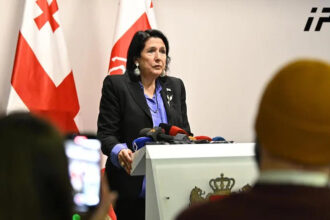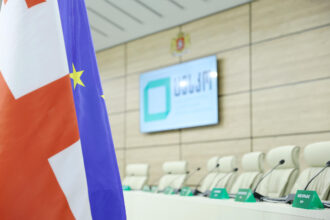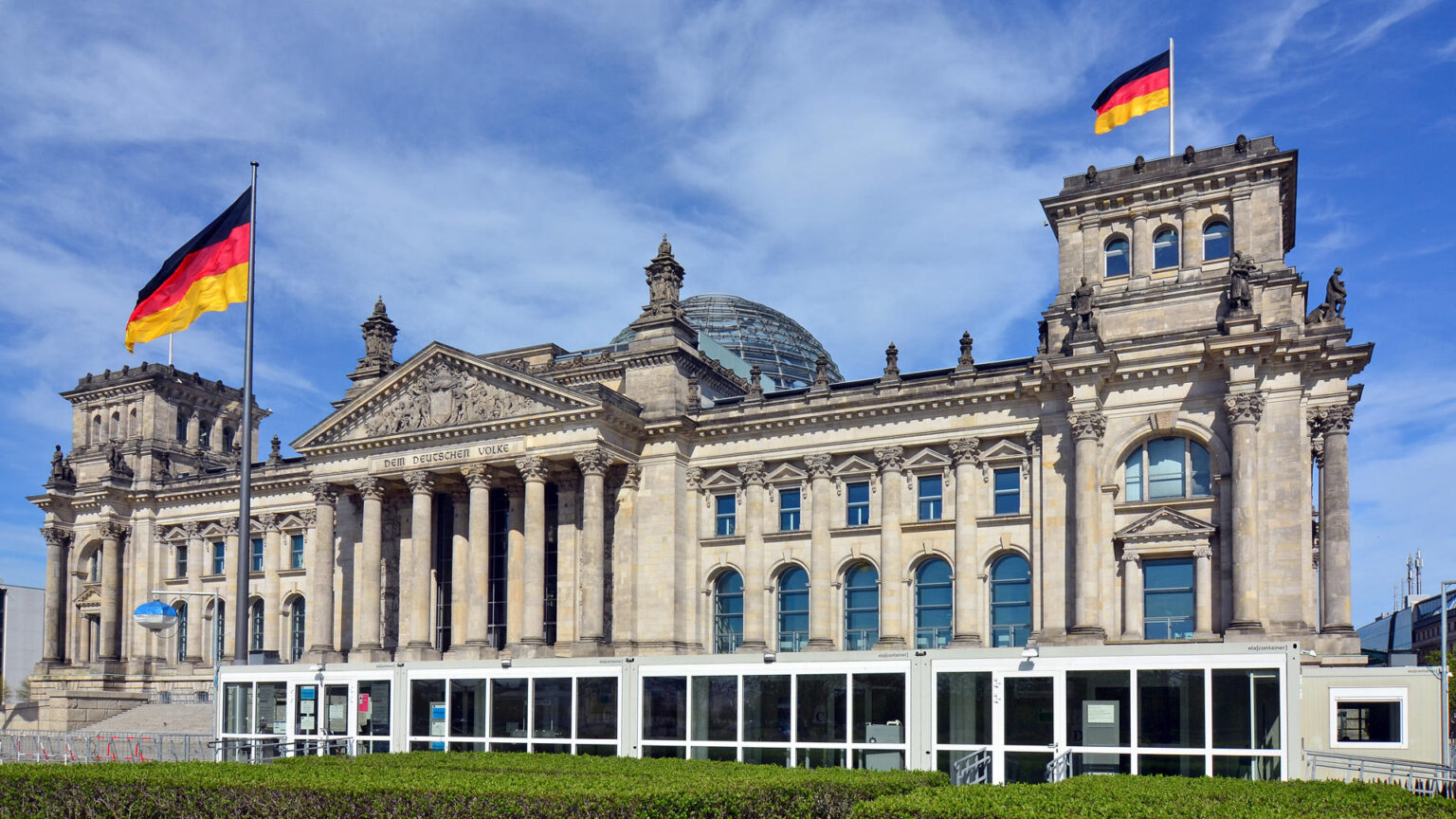The resolution was developed jointly by the “Social Democratic Party of Germany”, “Union 90/Greens”, and the “Liberal Democratic Party”.
As stated in the resolution the authoritarian, anti-European policy of the current Georgian government deliberately puts Georgia’s European Future at risk.
The document states that the so-called “Transparency of Foreign Influence Law” cannot and will not further progress the process of joining European Union.
Here, the role of honorary chairman “Georgian Dream”, is highlighted. It is also said that the goal to maintain Bidzina’s power is more important than Georgia’s European Future and democratic stability.
We offer the text of this resolution in its original form:
“The German Bundestag establishes”
Georgia’s civil society has fought for decades for democracy, freedom, and independence. The result of this is that, after the “Rose Revolution“, in 2003, Georgia became a progressive, democratic, and independent state on a global scale, and has moved closer to the European Union. During the rule of both the “United National Movement”, and the “Georgian Dream”, both advancements and setbacks were made on the road to getting closer to the European Union. The current Georgian government, despite the wishes of the majority of Georgians, has set a course that is authoritarian and antieuropean. This puts Georgia’s European future in danger. According to the law the so-called transparency of foreign influence cannot and will never be the next step of the process of Georgia joining the European Union.
Article 78 of Georgia’s Constitution declares that joining the European Union is a goal of the state. The European Union explained this aspiration: Georgia is a member of the Eastern Partnership, the European Neighborhood Policy and it signed a free trade and association agreement with the European Union in 2016. It came into force on July 1, 2016. Georgia in 2022 On 3 March, he submitted a request for membership in the European Union. Georgia was granted the candidate status in 2023 by the European Council, according to a decision made on December 14. Candidate Status was granted with the condition that Georgia implements priority measures including comprehensive judicial Reform and strengthening of anticorruption agencies before taking the next step towards integration. The European Union has paved the path for Georgia to join the European Union 32 years after its restoration. Now, those in Georgia who are responsible for the political decisions must take the necessary measures to fulfill the wishes and goals of the people and to achieve the European path.
The status of a candidate member was also an expression to the people of Georgia who, in recent history, have repeatedly defended their country’s independence and European future. Georgia has been and continues to be a victim of imperialist Russian aggression. 2008 After the five day war, the Russian Army, in violation international law, controls de facto a fifth Georgian territory. Russia has also diplomatically recognized Georgian separatist regions South Ossetia, and Abkhazia, as independent states. Russia has yet to fulfill its 2008 obligations under the six-point plan from August 15, which included, among other things, the withdrawal of Russian forces. The German Bundestag has recognized the territorial integrity Georgia. The criminal war that Russia has waged against Ukraine has sparked fears of a new war by Russia in Georgia. The people of Georgia are watching the events in Ukraine with great sympathy and solidarity.
In the past, all political forces in Georgia declared their desire to join the European Union and NATO. Over the years, the polarization between Georgian Dream and a large portion of the opposition and civil societies has grown. The increasingly authoritarian, divisive governance style of “Georgian Dream”, is what has fueled the political conflict in the run-up to the October 26th parliamentary elections. The goal of preserving power for the party’s founder, honorary chairman and Georgian oligarch BidzinaIvanishvili is more important than Georgia’s European Future and democratic stability.
The German Bundestag believes that the final adoption of this so-called “foreign influences” law was a grave mistake. This occurred despite the counter-promise of Georgia’s government in spring 2023, the massive, months-long protests of its population, the veto of Georgia’s president, and the clear position of both the European Union and Venice Commission of Council of Europe recommending the recall of the law. This law is incompatible to the democratic principles and central values of the European Union. It is specifically against the two priority steps that were agreed between Georgia and EU, namely the free movement of the civil society (Step 9), and the combating of disinformation against the EU (Step 1) This law is similar to the Russian “On Foreign Agents” law.
The Georgian government has turned its back on Europe, which is contrary to the goal of European Integration written in the Constitution and the desire of the Georgian population. The peaceful, multi-generational, and multi-week demonstrations by the Georgian population demanded that the law be recalled. The Bundestag shows its solidarity and acknowledges the peaceful protesters.
It is essential to create a free environment that allows for the free expression of media and civil society in Georgia. The demand for transparency must not be used to stigmatize and restrict the freedom of civil society organizations. The German Bundestag expects cases of intimidation and violence against members and journalists of civil society and the LGBTQIA+ communities, as well as opposition politicians, to be stopped immediately and prosecuted. The German Bundestag stresses that a free, independent civil society as well as an independent media are integral parts of a stable democracy and necessary for critical coverage of fundamental EU reforms.
The independent cultural sector in Georgia is a driving force of the democratic process. It is also a key component of an open, democratic society. The German Bundestag stresses that the rights of culture workers should be protected and that freedom and independence of the arts should be guaranteed. This includes the independent management of state-funded cultural institutions.
The German Bundestag also condemns the violence, intimidation and atmosphere on the streets of Tbilisi. Georgia’s international obligations to protect human rights are not met by the excessive use of force against demonstrators. Georgians who have repeatedly affirmed their clear preference for democracy should be able to peacefully exercise their right to free expression and to assemble. Threats, violence, and defamation campaigns against civil society, the media, opposition, and local employees of international organisations and their families are unacceptable. State officials are being pressured to support the ruling party, “Georgian Dream”, and not criticize it, even if they face dismissal. This is in direct contradiction to the principles of democracy and rule of law that Georgia has committed to as a signatory of the Universal Declaration of Human Rights and European Convention on Human Rights, a member of Council of Europe, and a member of Organization for Peace and Cooperation in Europe.
The leadership of “Georgian Dream”, by acting increasingly authoritarian, is trying to create an atmosphere of fear. They do this by dividing the society into friends/patriots/traitors and enemies/traitors. There was no attempt made to overcome the polarization. The recent statement by Irakli Kobakhidze about his desire to ban opposition parties after the election is also unacceptable and inconsistent with European understandings of democracy.
Georgian Dream also uses disinformation and harassment against LGBTQIA+ to gain votes. The German Bundestag finds the recent massive restrictions on their rights and the stigmatization of LGBTQIA+ individuals dictated by political agenda unacceptable. This further divides Georgian Society.
The upcoming parliamentary election will be a historic decision for Georgia in terms of the democratic and legal state, and the country’s European path. The attacks on independent monitoring groups, the negative impact that the “Foreign influence” law has on their ability to function, recent changes to electoral legislation which increase the influence of ruling party within the Central Election Commission as well as mobilization of administrative resource to support the policies “Georgian Dream”, as well as the mobilization to support the “Georgian Dream”, have led to questions about the equality and freedom of the upcoming elections. Parliamentary elections must be held in an environment that is non-violent, fair and allows for peaceful and respectful concentration on the contents of politics. Georgia, as an EU candidate, a member of the Council of Europe, and the OSCE in the interest of its citizens, should respect and protect these basic principles of democratic election. In this context, the German Bundestag is pleased that Georgia has invited the ODIHR to observe the parliamentary election. The international community must closely monitor the observance by Georgia of democratic principles during the parliamentary election. The German Bundestag is prepared to participate in elections observation missions in Georgia.
The German Bundestag, taking into consideration the budgetary parameters, calls on the federal Government:
Promote the full implementation of decisions taken by the European Union on June 17, 2024.
At the European level insist that no progress will be made with Georgia on the path to joining the European Union until the law on “transparency of influence from abroad” is in effect. The Venice Commission of the Council of Europe has also asked for the recall of the legislation.
In the spirit of the European Council decisions of June 27, 2024 promote free and fair parliamentary elections by supporting the OSCE (ODIHR), and the Parliamentary Assembly of the Council of Europe international election observation missions, and make the future formation of relations with Georgia contingent on the fairness and freedom of the parliamentary polls;
When evaluating elections on the basis of OSCE and EU reports it is important to pay attention to whether long-term monitoring missions question undemocratic pre-election practices, e.g. The mobilization of administrative resources in support of the policy of the ruling parties, the legitimacy of elections.
Call on the leadership of Georgia not to prosecute the peaceful protesters by the police or the prosecutor’s office.
At the European level promote the withdrawal of laws which severely restrict the rights of LGBTQIA+ people as a condition for Georgia’s continued accession to the European Union. Also, tax the parliamentary majority “Georgian Dream”, to withdraw these laws. The planned changes to the constitution and legislation are not just an attack on the LGBTQIA+ Community, but also on freedom of expression, human rights and civil society.
At the European level promote that as part of the EU accession process, the Government of Georgia be called upon to withdraw its “Law on Offshores”, adopted in May 2024. This law weakens economic transparence and the fight against corrupt practices and may provide an opportunity to evade sanction;
Call on Russia unconditionally to respect the territorial integrity and sovereignty of Georgia, and to condemn any Russian intervention in de facto controlled territory in violation of international laws as well as any attempts to further destabilize Georgia.
At the European level, encourage the continuation of visa-free traveling for the Georgian population, despite its setback in democratic reforms, as the suspension of visa free travel would affect all of Georgia’s population and therefore the pro-European movements;
Support non-bureaucratically repressed civil societies activists and LGBTQIA+ people and, if needed, adapt measures to their protection.
Monitor the situation in Georgia to identify any facts that might serve as a pretext to impose targeted sanctions.
The resolution states: “Intensify the cultural exchanges with the civil societies of Georgia and be careful when giving federal funds for state institutions in Georgia that they do not use them to move away from the democratic standards the country.”
Read More @ www.interpressnews.ge













